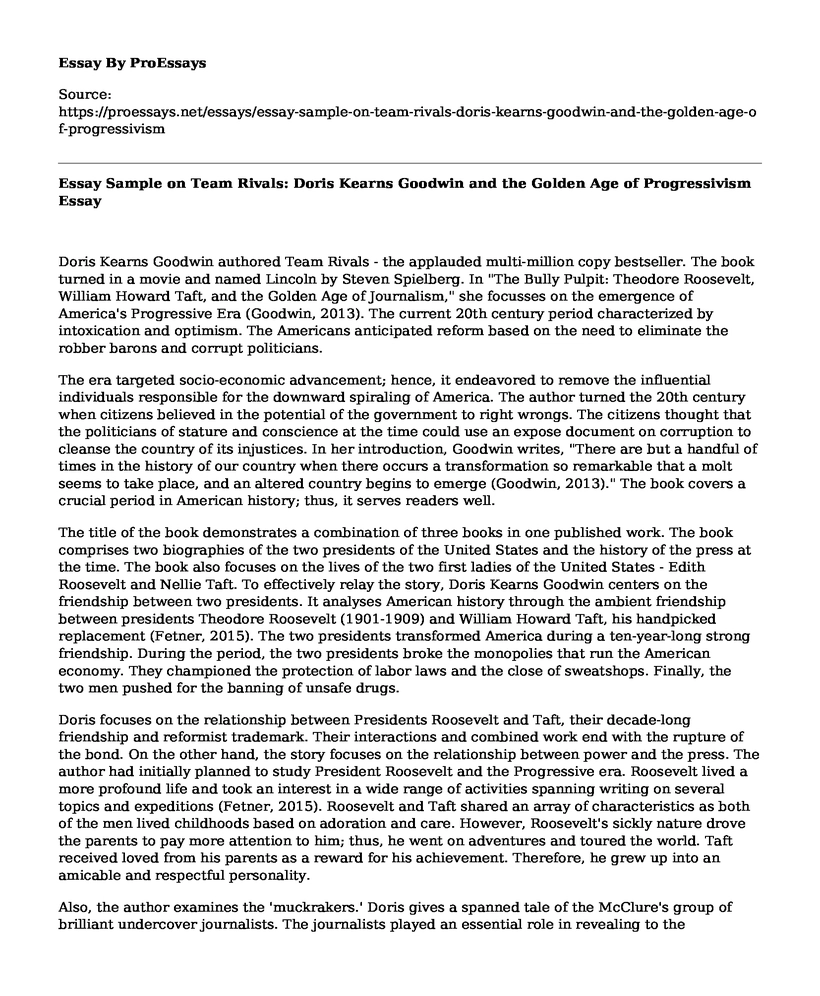Doris Kearns Goodwin authored Team Rivals - the applauded multi-million copy bestseller. The book turned in a movie and named Lincoln by Steven Spielberg. In "The Bully Pulpit: Theodore Roosevelt, William Howard Taft, and the Golden Age of Journalism," she focusses on the emergence of America's Progressive Era (Goodwin, 2013). The current 20th century period characterized by intoxication and optimism. The Americans anticipated reform based on the need to eliminate the robber barons and corrupt politicians.
The era targeted socio-economic advancement; hence, it endeavored to remove the influential individuals responsible for the downward spiraling of America. The author turned the 20th century when citizens believed in the potential of the government to right wrongs. The citizens thought that the politicians of stature and conscience at the time could use an expose document on corruption to cleanse the country of its injustices. In her introduction, Goodwin writes, "There are but a handful of times in the history of our country when there occurs a transformation so remarkable that a molt seems to take place, and an altered country begins to emerge (Goodwin, 2013)." The book covers a crucial period in American history; thus, it serves readers well.
The title of the book demonstrates a combination of three books in one published work. The book comprises two biographies of the two presidents of the United States and the history of the press at the time. The book also focuses on the lives of the two first ladies of the United States - Edith Roosevelt and Nellie Taft. To effectively relay the story, Doris Kearns Goodwin centers on the friendship between two presidents. It analyses American history through the ambient friendship between presidents Theodore Roosevelt (1901-1909) and William Howard Taft, his handpicked replacement (Fetner, 2015). The two presidents transformed America during a ten-year-long strong friendship. During the period, the two presidents broke the monopolies that run the American economy. They championed the protection of labor laws and the close of sweatshops. Finally, the two men pushed for the banning of unsafe drugs.
Doris focuses on the relationship between Presidents Roosevelt and Taft, their decade-long friendship and reformist trademark. Their interactions and combined work end with the rupture of the bond. On the other hand, the story focuses on the relationship between power and the press. The author had initially planned to study President Roosevelt and the Progressive era. Roosevelt lived a more profound life and took an interest in a wide range of activities spanning writing on several topics and expeditions (Fetner, 2015). Roosevelt and Taft shared an array of characteristics as both of the men lived childhoods based on adoration and care. However, Roosevelt's sickly nature drove the parents to pay more attention to him; thus, he went on adventures and toured the world. Taft received loved from his parents as a reward for his achievement. Therefore, he grew up into an amicable and respectful personality.
Also, the author examines the 'muckrakers.' Doris gives a spanned tale of the McClure's group of brilliant undercover journalists. The journalists played an essential role in revealing to the Americans the ills in the society through the publication of exposes on corruption involving the politicians and business people. President Roosevelt relied on the present by the journalists to engage in his objective of cleansing the United States of America of corruption and bringing fairness through change (Fetner, 2015). The White House relied on the press to perform its intelligence work. President Roosevelt took an interest in daily newspaper excerpts and engaged reporters to test his ideas on several issues. His policies on change developed from his correspondence with the journalists. The cooperation between presidents Roosevelt, Taft, and the muckrakers led to the confrontation of corruption and exploitation; thus, the renewal of the United States.
References
Fetner, G. L. (2015). The Bully Pulpit: Theodore Roosevelt, William Howard Taft, and the Golden Age of Journalism. American Journalism, 32(2), 243-245. doi:10.1080/08821127.2015.1036697
Goodwin, D. K. (2013). The Bully Pulpit: Theodore Roosevelt, William Howard Taft, and the Golden Age of Journalism. New York, NY: Simon & Schuster.
Cite this page
Essay Sample on Team Rivals: Doris Kearns Goodwin and the Golden Age of Progressivism. (2023, Mar 07). Retrieved from https://proessays.net/essays/essay-sample-on-team-rivals-doris-kearns-goodwin-and-the-golden-age-of-progressivism
If you are the original author of this essay and no longer wish to have it published on the ProEssays website, please click below to request its removal:
- Essay on the Play 'Tempest' by Shakespeare: Alternative Ending
- Literary Analysis Essay on Connection Between Gender and Class in Respectable Woman by Kate Chopin
- The Fall of the House of Usher Chapter One Passage Analysis Essay
- The Theme of Mortality in August Wilsons' "Fences"
- Discovering the Power of Poetry With Eagle's Work: Lesson Plans
- Essay Example on Child Narrator: Delivering Stories With Meaning
- Essay on Remember and Blood: Living Life Despite Undesirable Experiences







